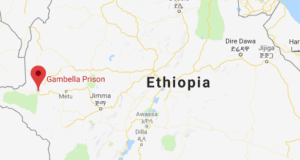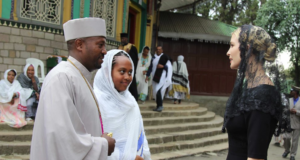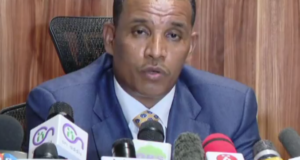ESAT News (July 20, 2018) The United States has praised the leadership of Prime Minister Abiy Ahmed and expressed keen interest in supporting democracy, human rights and good governance in Ethiopia.
 Speaking at the 8th Bilateral Dialogue on Human Rights, Democracy, and Governance held yesterday at the Ethiopian Ministry of Foreign Affairs, Ambassador Michael Raynor noted that the United States is eager to seize the new opportunities “at an extraordinary and historic moment in Ethiopia, when we see one of the United States’ most important partners charting a course toward long-term stability, prosperity, and political inclusiveness.”
Speaking at the 8th Bilateral Dialogue on Human Rights, Democracy, and Governance held yesterday at the Ethiopian Ministry of Foreign Affairs, Ambassador Michael Raynor noted that the United States is eager to seize the new opportunities “at an extraordinary and historic moment in Ethiopia, when we see one of the United States’ most important partners charting a course toward long-term stability, prosperity, and political inclusiveness.”
“In his first 100 days in office, the Prime Minister has made extraordinarily strong, clear, and forthright statements, and has led the Government of Ethiopia to take some important steps, toward promoting human rights and creating an inclusive political environment,” the Ambassador remarked.
Ambassador Raynor said that the selection of Prime Minister Abiy is an important milestone that reflected the aspirations of the Ethiopian people for a more inclusive and responsive political system.
“We are ready and eager to learn more about the Government of Ethiopia’s priorities and plans in these areas, and to identify concrete actions that the United States can take to support Ethiopia’s aspirations for a more inclusive and more democratic future,” Raynor noted.
Deputy Assistant Secretary Scott Busby of the State Department Bureau of Democracy, Rights, and Labor also expressed enthusiasm with the reform process undergoing in Ethiopia. “U.S. officials in Washington are very excited about the opportunities presented by recent developments in Ethiopia, and will be exploring various ways in which we can help.”
State Minister at the Ministry of Foreign Affairs Dr. Aklilu Hailemichael said on his part that the government welcomes the commitment to provide support in the areas of justice, human rights, conflict prevention, good governance and the strengthening of democratic institutions.
At the conclusion of the dialogue, the two sides agreed bilateral cooperations to support and strengthen the electoral system, respect for human rights, fight corruption, and widen space for independent media and civil society. They also agreed to enhance a system of accountability for human rights abuses.
 The Ethiopian Satellite Television and Radio (ESAT) No. 1 Ethiopian news media: Esat, Ethiopian news, daily Ethiopian news, ESAT tv, ESAT Radio, Ethiopia
The Ethiopian Satellite Television and Radio (ESAT) No. 1 Ethiopian news media: Esat, Ethiopian news, daily Ethiopian news, ESAT tv, ESAT Radio, Ethiopia





